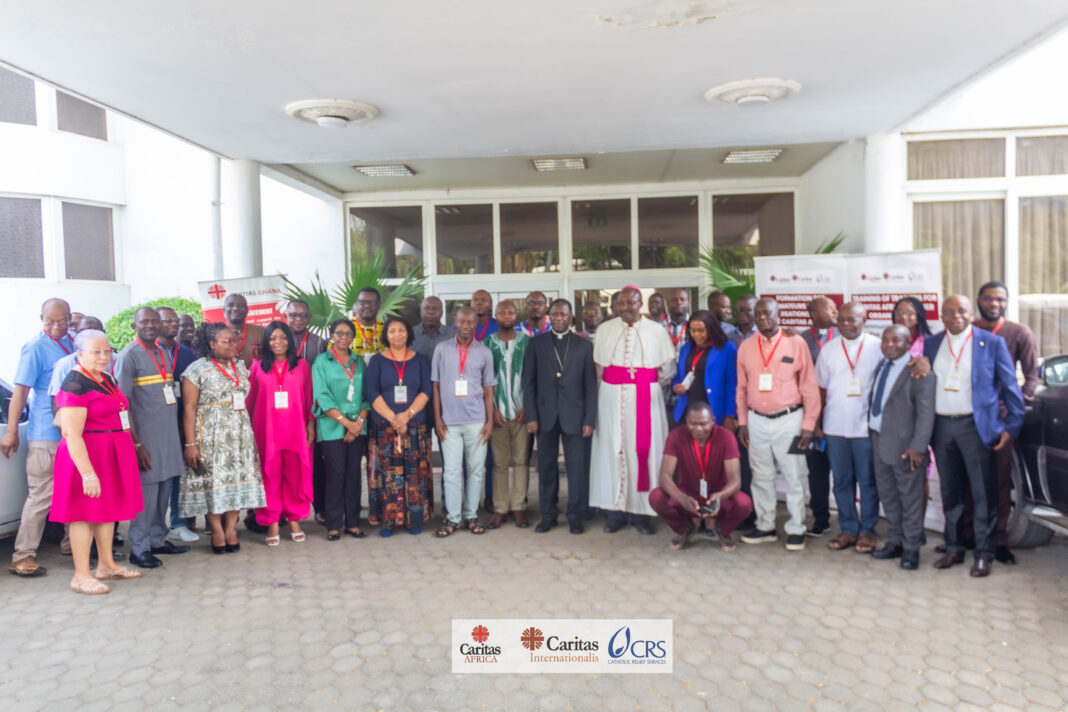A three-day training of trainers workshop for Caritas Africa Directors and Technical Staff has opened in Accra to build their capacity with knowledge and facilitation skills in Community led Disaster Risk Management (CLDRM).
The training was opened on Monday, December 2, 2024 at the Ghana Institute of Management and Public Administration (GIMPA) by the Most Rev. Gabriel Edoe Kumodji, SVD, Bishop of Keta-Akatsi and Episcopal President of Caritas Ghana.
About 50 participants mostly from the Regional Episcopal Conferences of West Africa (RECOWA/CERAO), the Association of Member Episcopal Conferences of Eastern Africa (AMECEA) and Madagascar and Episcopal Conferences of Indian Ocean (CEDOI-M zones) zones are attending the ongoing training which would end on Wednesday, December 4.
The participants are from Ghana, Benin, Cape Verde, Cote d’Ivoire, Gambia, Guinea Conakry, Guinea Bissau, Burkina Faso, Mali, Niger, Senegal, Togo and Liberia from the RECOWA zone; Cameroun, Equatorial Guinea, Central Africa Republic, Congo Brazzaville and Gabon from ACERAC. Those from AMECEA and CEDOI are Sudan, Malawi, Uganda and Eritrea, Madagascar and Seychelles.
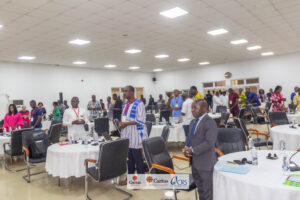
Opening the training, Bishop Kumordji expressed joy to see so many dedicated leaders gathered in Accra ready to strengthen their ability to serve their communities.
He said that disaster risk management was an urgent need in our time, noting that from floods and droughts to conflicts and health crises, disasters disproportionately affect the poor and marginalized, often leaving them with little hope for recovery.
“As a Church, we are called to stand in solidarity with these vulnerable communities, not only by responding to their immediate needs but also by equipping them to prepare for and reduce the risks of future disasters,” he said.
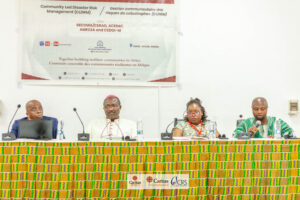
The workshop, organized by Caritas Africa and hosted by Caritas Ghana, he stated was a testament to the Church’s commitment to empowering local communities, sating, “ It reflects the principle of subsidiarity, which places the responsibility for solutions as close to the people as possible.”
According Bishop Kumordji, by engaging leaders from across the RECOWA/CERAO and ACERAC zones, “this initiative fosters a shared sense of responsibility and collaboration.”
He pointed out that “At the same time, the workshop aligns with global and regional priorities, including the African Union’s Agenda 2063 and Ghana’s Vision 2057,” adding, “These connections underscore the Church’s role as a partner in sustainable development and a beacon of hope in the face of adversity.”
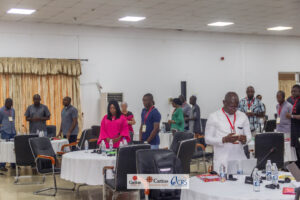
He commended the organizers and participants for their dedication to this mission and encouraged them to embrace this opportunity to learn, share experiences, and strengthen partnerships. Your leadership will have a lasting impact on the lives of the people you serve.
Present at the opening ceremony were the Most Rev. Julien Kaboré, Apostolic Nuncio to Ghana; Msgr. Pierre Cibambo Ntakobajira, President of Caritas Africa; Ms. Lucy Esipila, Regional Executive Coordinator of Caritas Africa; Mr. Richard Akurugu, National Director of Caritas Ghana; Rev. Fr. Vitalis Chinedu Anaehobi, Secretary General of RECOWA.
Others were Very Rev. Fr. Clement Adjei, Secretary General of the National Catholic Secretariat, Accra; Rev. Fr. Edwin Terrence Adzimah, Acting Executive Secretary for the Department of Human Development at the NCS; Rev. Fr. Michael Ackon Quaicoe, Director of Governance, Justice and Peace at the NCS.
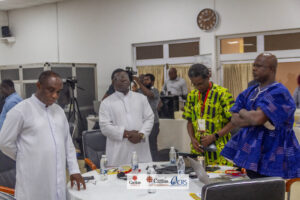
Caritas Africa is a social pastoral ministry of the Catholic Church in Africa. It is a network of 46 National Caritas Organisations in 46 African countries; including adjacent islands in the Atlantic and Indian Oceans. Caritas Africa is headquartered in Lomé, Togo.
As a social pastoral instrument of the Church and an indispensable dimension of its evangelizing mission. Caritas Africa’s specific role is to assist the bishops in their ministry of charity. Such task is carried out by attending to the poorest and neediest, assisting in humanitarian emergencies, and helping to spread charity and justice in the world in the light of the Gospel and of the teaching of the Catholic Church.
Miss Lucy Esipila, the Regional Executive Coordinator of Caritas Africa in her speech, highlighted key roles Caritas Africa has played in the continent in fostering disaster management since 2020.
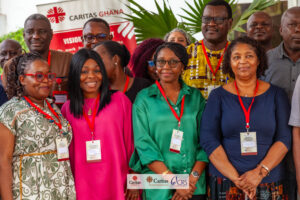
She said, “Since 2020, Caritas Africa has done a lot of work in terms of promoting disaster management in the region. We started with research when there was COVID… We decided to do a paper on how to conduct advocacy within the context of Disaster Risk Reduction in 2022.”
Additionally, she stated that Caritas Africa has worked in Pretoria in South Africa, Botswana, Kigali in Rwanda, Democratic Republic of Congo and Burundi, where training for technical staff and National Directors of Caritas on Disaster Risk Reduction was organized.
She remarked that Caritas Africa has “planted a seed within the region” and asked members for the way forward after planting the seed in member organizations.”
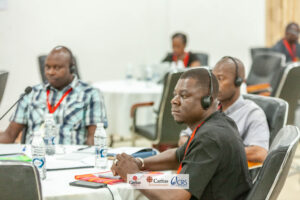
Miss Esipila said that the training over the past years has taking a lot of time and resources and encouraged the participants to reflect on the way forward in developing Disaster Risk Reduction action plan.
“We want to sit down and reflect as National Caritas organizations, as different actors within our different roles, how do we take this agenda forward and even if the funding is no longer there, how do we take forward the seed that we have planned,” she stated.
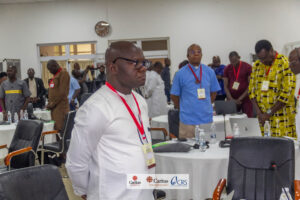
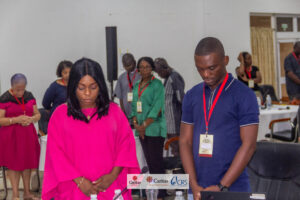
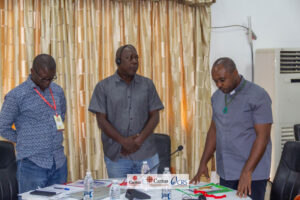
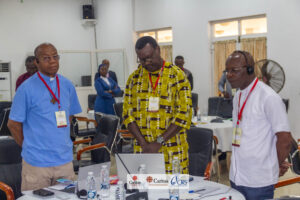
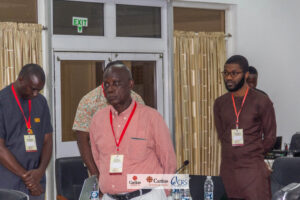
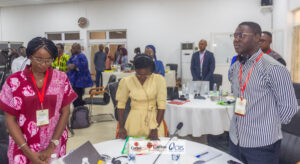
By Veronica Sena Amenya// Newswatchgh.com

